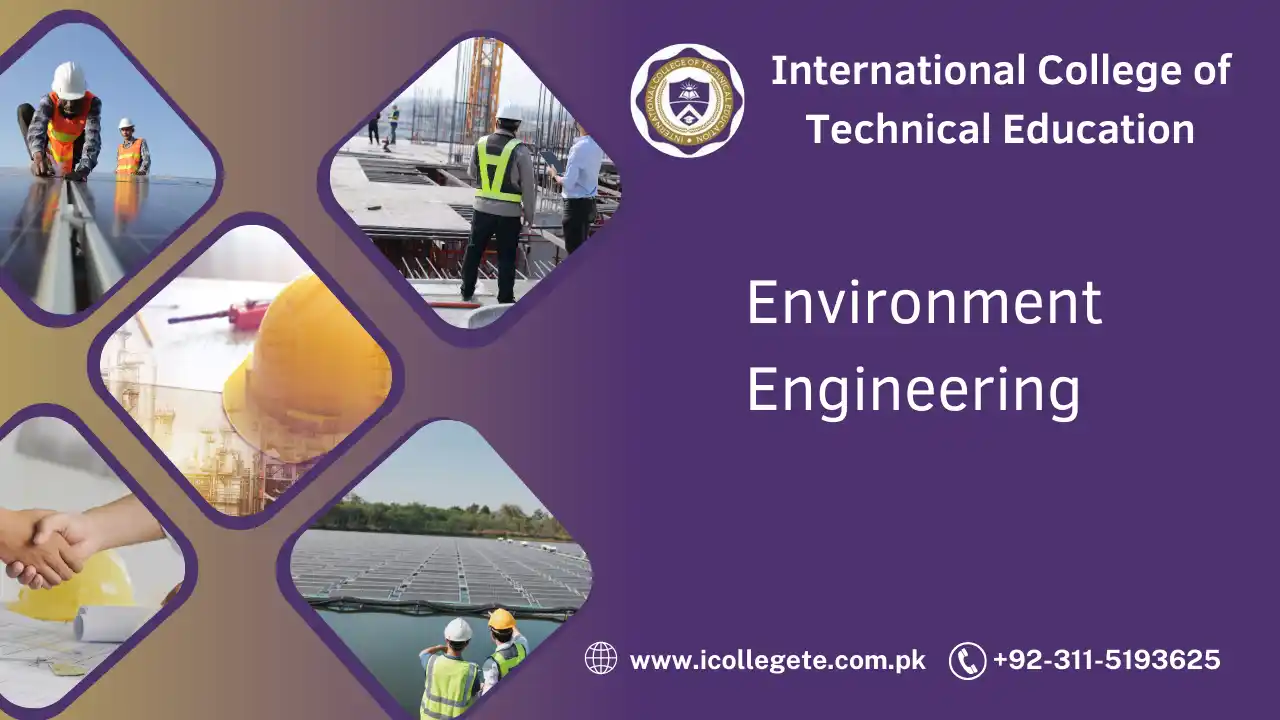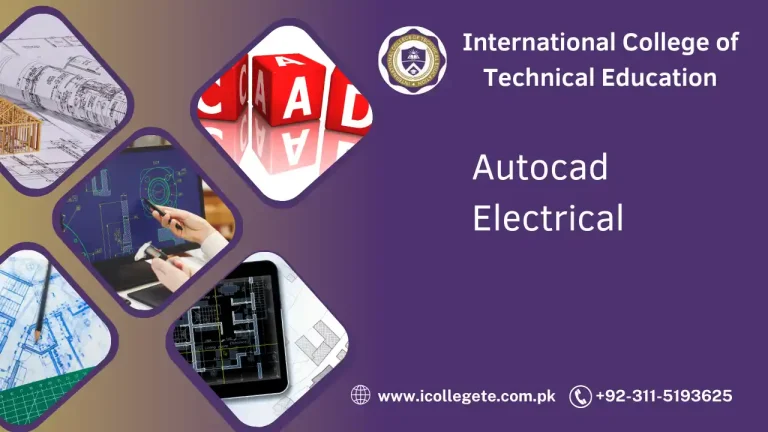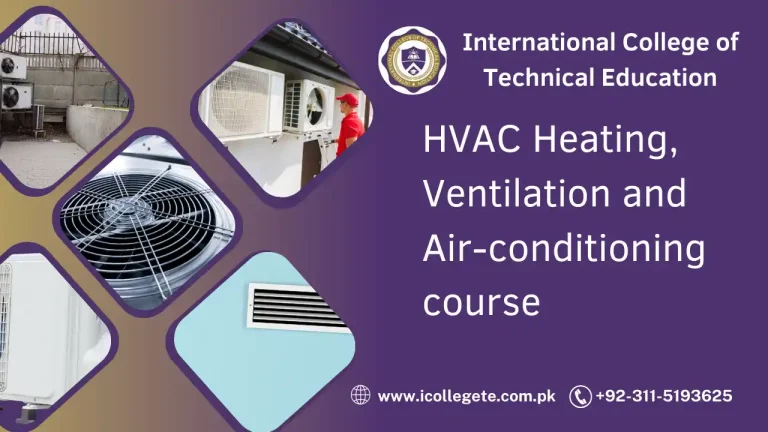As environmental concerns become increasingly important across the globe, the demand for skilled professionals in environmental engineering is on the rise. In Sialkot, the Environmental Engineering course provides aspiring engineers with the knowledge and practical skills to contribute to sustainability and tackle pressing environmental challenges.
The Environmental Engineering course in Sialkot is designed for individuals who are interested in solving environmental issues through engineering principles. Environmental engineers play a critical role in improving public health by reducing pollution, managing waste, and ensuring the sustainable use of natural resources.
The course combines theoretical knowledge with hands-on experience, ensuring that students are well-prepared to tackle real-world environmental problems. Graduates of the program will be ready to work in a variety of industries, such as construction, manufacturing, waste management, and government agencies, where environmental protection is a key focus.
Course Overview
The Environmental Engineering course in Sialkot provides an in-depth exploration of environmental issues and how they can be addressed through engineering solutions. The course covers the scientific, technological, and regulatory aspects of environmental protection and sustainability. Students will learn how to assess environmental risks, design treatment systems for air, water, and waste management, and understand the role of environmental law in shaping policies.
The course curriculum is designed to provide both theoretical foundations and practical experience. It includes lectures, case studies, site visits, and project-based learning, giving students a comprehensive understanding of environmental engineering practices. Upon completion, graduates will be equipped with the knowledge and skills to work in various sectors dedicated to environmental protection and sustainable development.
Study Units
The Environmental Engineering course is divided into several key study units that address different aspects of the field. These include:
- Introduction to Environmental Engineering
- Overview of environmental challenges and the role of engineering in addressing them.
- Basic principles of environmental engineering, sustainability, and environmental science.
- Environmental ethics and the social responsibility of engineers.
- Environmental Pollution and Control
- Types of pollution: air, water, soil, and noise pollution.
- Pollution control technologies, including waste treatment, emission control, and pollution monitoring.
- Case studies of successful pollution control initiatives.
- Water Treatment and Management
- Principles of water quality and the importance of safe drinking water.
- Water treatment processes (filtration, chemical treatment, disinfection, etc.).
- Wastewater management, sewage treatment, and reuse of treated water.
- Waste Management and Disposal
- Types of waste: solid, liquid, hazardous, and e-waste.
- Waste reduction, recycling, and waste-to-energy technologies.
- Landfill design and waste disposal regulations.
- Environmental Impact Assessment (EIA)
- Methods for assessing the environmental impact of industrial and construction projects.
- Legal and regulatory requirements for conducting an EIA.
- Case studies of environmental impact assessments in various industries.
- Renewable Energy and Sustainable Design
- Renewable energy technologies (solar, wind, biomass, etc.).
- Sustainable building practices and green infrastructure.
- Energy conservation strategies and carbon footprint reduction.
- Environmental Policy and Regulation
- International and local environmental laws and policies.
- Environmental management systems (EMS) and certifications.
- Role of governments, NGOs, and businesses in environmental protection.
Learning Outcomes
Upon successful completion of the Environmental Engineering course in Sialkot, students will be able to:
- Understand the principles of environmental science and how they apply to engineering solutions for environmental problems.
- Design and implement water and wastewater treatment systems, including understanding various treatment methods and their applications.
- Assess environmental pollution and develop strategies for controlling air, water, and soil pollution.
- Evaluate the environmental impact of industrial, construction, and other projects through Environmental Impact Assessments (EIA).
- Utilize renewable energy technologies and sustainable practices to reduce environmental footprints and promote sustainability.
- Navigate environmental laws and regulations, ensuring compliance and promoting eco-friendly business practices.
Course Benefits
- In-depth Knowledge: The course offers a solid foundation in environmental science and engineering, providing you with the technical expertise to tackle real-world environmental challenges.
- Hands-On Training: Through practical learning, including site visits and project-based work, students gain practical experience and develop problem-solving skills.
- Career Opportunities: Graduates are well-equipped to enter various industries such as construction, manufacturing, waste management, water treatment, and government agencies, where the demand for environmental engineers is growing.
- Global Relevance: With increasing global concerns about climate change, pollution, and sustainability, the skills learned in this course are highly relevant across industries worldwide.
- Environmental Impact: The course empowers students to make a significant difference by contributing to environmental protection and sustainable development efforts in their communities and workplaces.
- Industry Connections: By engaging in real-world projects, site visits, and collaborations with industry professionals, students can develop a network of contacts that can help in their future careers.
Who is This Course For?
The Environmental Engineering course in Sialkot is ideal for:
- Aspiring Engineers: Individuals with an interest in engineering and environmental science who want to specialize in the design and implementation of environmentally friendly solutions.
- Graduates in Science or Engineering: Those with a background in engineering, biology, chemistry, or environmental science who wish to pursue a career in environmental protection and sustainability.
- Professionals Looking for Specialization: Engineers or professionals in other fields who want to specialize in environmental engineering and sustainable practices.
- Government and Industry Workers: Those working in regulatory bodies or industries that require knowledge of environmental protection standards, sustainability, and resource management.
Future Progression for This Course
After completing the Environmental Engineering course in Sialkot, there are various pathways for further specialization and career progression:
- Master’s in Environmental Engineering or Sustainability: Graduates can pursue higher education to specialize in advanced topics such as environmental management, water resources, or renewable energy systems.
- Professional Certifications: Certifications such as LEED (Leadership in Energy and Environmental Design), ISO 14001 (Environmental Management Systems), and other industry-recognized qualifications can enhance career prospects in environmental consulting and project management.
- Environmental Consultant: Graduates can work as environmental consultants, helping businesses and governments design sustainable practices, reduce environmental impacts, and comply with regulations.
- Government and Policy Roles: Environmental engineers often work with government agencies to develop policies and regulations aimed at protecting natural resources and promoting sustainable development.
- Renewable Energy Sector: As renewable energy technologies become more important, environmental engineers can specialize in the design, installation, and management of sustainable energy systems, such as solar, wind, and bioenergy.
- Industry Leadership Roles: With experience, graduates can move into managerial or executive roles in large corporations or industries focused on sustainability and environmental protection.
The Environmental Engineering course in Sialkot provides an exciting opportunity for individuals passionate about environmental protection and sustainability. This course offers the knowledge and skills needed to address the growing environmental challenges of today and tomorrow. Whether you’re interested in designing pollution control systems, assessing environmental risks, or working with renewable energy technologies, this course will equip you with the tools to succeed in a wide range of industries. Start your journey towards a rewarding career in environmental engineering and contribute to a greener, more sustainable world.







